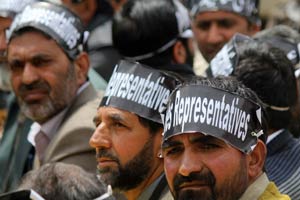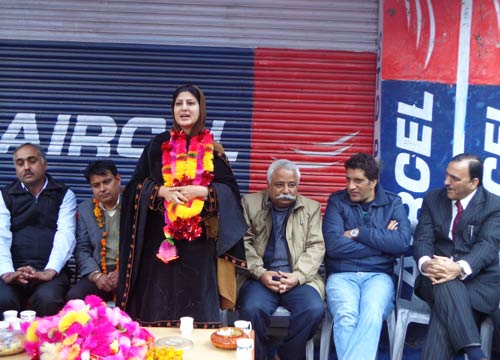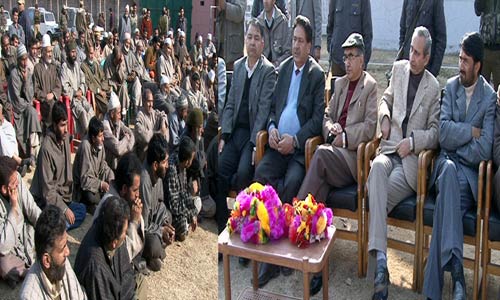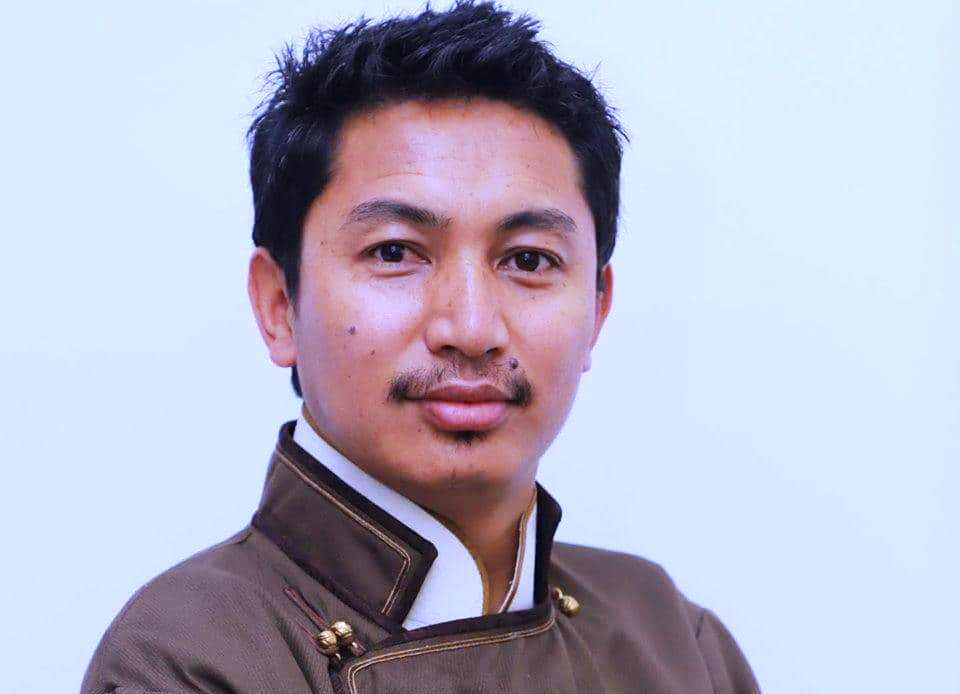Touted to bring a new era of democracy in conflict-torn Kashmir, the elected members of Panchayat Raj institutions have been reduced to a mere specter of political opportunism. Amid allegations of corruption by the ruling coalition and the opposition, Shah Abbas sheds light on the controversies surrounding the upcoming legislative elections.
The Panchs and Sarpanchs elected on non-party basis in 2011 are nowadays seen in big herds around the offices of mainstream political parties of Jammu and Kashmir. These Panchs and Sarpanchs are set to vote for the candidates of National Conference, People’s Democratic Party and Congress in Legislative Council polls scheduled on Dec 3. Touted to usher in a new era of democracy, the representatives of Panchayati Raj have merely been reduced to voters now.
Sources in the ruling National Conference, Congress and Peoples Democratic Party reveal that Panchs and Sarpanchs are being pleased by every mainstream political party using every possible means ever since the election process for the four reserved seats in LC started.
Chief Patron of Jammu Kashmir Panch Sarpanch United Forum (JKPSUF), Ghulam Nabi Mir, says, “As everybody knows that we live in a corrupt world, Panchs and Sarpanchs are the members of same society. So I can’t rule out corruption.”
“I was in Chief Minister Omar Abdullah’s rally in Kulgam. In his speech, Omar sahib told the Panchs that since they were being offered Ristas and Kababs, his advice to them was that they must surely taste these Ristas and Kababs. ‘But when the time of voting comes, you must vote ignoring everything’,” said Mir, adding, “Every political party is trying to convince the voters by using different tactics and yes, corruption can’t be ruled out.”
“Politics is a game of opportunities. So we too are trying to grab more and more out of this opportunity and our main aim is to get empowerment. So we are trying to convince the political parties so that our goal is achieved,” said a Sarpanch who claims to have influence on more than 400 Panchayati representatives and often addresses media in Srinagar since his election.
After the death of a Sarpanch in north Kashmir , a large number of Panchs and Sarpanchs resigned by issuing paid advertisements in local dailies. The resigned Panchs and Sarpanchs had alleged that they were being used as scapegoats by the political parties of the state which had neither empowered them nor provided them any security.
Now when the elections for the four reserved seats in the legislative council are very close, the government revealed that it has not accepted any resignations of any Panch or Sarpanch from 4128 Panchayats spread across 22 districts of Jammu and Kashmir because they had not completed the essential formalities.
Rural development minister, Ali Mohammed Sagar, while talking to Kashmir Life, said, “Around 58 Sarpanchs had come forward with their resignations. But due to some technical issues, their resignations were not accepted.”
He added that the aggrieved Sarpanchs were asked to complete certain modalities so that their resignations were accepted. “They did not complete the formalities and hence the process remained incomplete. So no Sarpanch has resigned from any Panchayat,” Sagar added. He maintained that the process of resignation which an elected Panch or Sarpanch has to follow is not as simple as was speculated in the media.
Sagar is hopeful that every Panchayati representative will cast his vote and there will be hundred percent polling. “I think that every Panch and Sarpanch will participate in elections baring a few. To me, even 80 percent voting will be more than enough,” the minister said.
JKPSUF patron, G N, Mir says that given the circumstances prevailing in Kashmir, nothing could be said about the participation of the elected Panchayti Raj representatives in the elections. “The approval of insurance cover and the assurances about monthly remuneration will certainly encourage every Panch and Sarpanch to vote. These two steps even developed greed among Panchayati representatives and they refrained from resigning,” G N Mir said.
Regarding the newspaper reports that more than 500 Sarpanchs had resigned, sources in the government said that the rural development office did not receive any resignation letter. “We had tremendous pressure from our kith and kin because they were afraid of the situation. So what we did was we announced our resignation through newspapers only and it worked. Our near and dear ones felt relieved. Now there is no pressure on us. We will use our right to vote,” a Panch told Kashmir life, on the condition of anonymity.

Since the J&K’s rural development department (RDD) claimed that no Panchayat member has resigned, the Electoral College for four seats to the legislative council comprising of 33,485 Sarpanchs and Panchs are set to enjoy their right to franchise on Dec 3.
Whatever the results of the LC polls might be, they have minimized the gap between the two coalition partners for the time being. Chief minister, Omar Abdullah, while calling the NC-Cong coalition ‘natural’, even gave a vibrant hint of a pre-poll alliance for the 2014 assembly poll, something NC’s Mustafa Kamal rejected the other day.
A Long Process
While 17,912 Panchayat members would press buttons of Electronic Voting Machines in Kashmir division for two LC seats, 15,628 Sarpanchs and Panchs would vote for two candidates in Jammu division. 37 candidates are in the fray for the four state legislative council seats reserved across J&K. Of these, 16 candidates are contesting two seats in Kashmir valley and 21 are fighting it out for two seats in Jammu.
The state has a total of 33,485 Panchayat members who would decide the fate of 37 candidates. The polling is being held at each of the 145 blocks in the state out of which 69 have been marked as sensitive, 25 hypersensitive and 51 normal polling stations. Out of the 77 polling stations in Kashmir division including Ladakh, 42 are sensitive, 11 hypersensitive and 24 normal.
There are only 12 normal polling stations in Kashmir valley which fall in Baramulla district. The six polling stations of Kupwara district have been categorized as hypersensitive. All the eight polling stations in Budgam district of central Kashmir and the five polling stations in five blocks of Bandipore district of north Kashmir have been categorized as sensitive.
Although the 2011 Panchayat elections were fought on a non-party basis, various political parties including the Congress, the NC and the opposition, People’s Democratic Party (PDP), had fielded candidates in those elections. The support base of any single political party in the valley and the Jammu region is far from clear.
Though it is generally believed that the ruling alliance has a fair chance, those in the opposition camp say they can pull off a surprise. Although the outcome of the elections to the four legislative council seats would have no direct impact on the 2014 assembly polls, it may indicate the mood of voters.
Meanwhile, in a bid to ensure free and fair polling, the Election Commission of India (ECI) has appointed two senior IAS officers as ‘Observers’ to oversee the polling process, which were being held after nearly four decades. Shant Manu, Commissioner Secretary, Industries department has been appointed as ‘Observer’ for Kashmir division while Atal Duloo, Commissioner Secretary, Tourism department, would be the ‘Observer’ for Jammu division, official sources said.
The observers would oversee the polling process and meet candidates, if required, to attend to their complaints and other issues during the election process, which would conclude on December 6 with counting of the votes. Sources said a total of 290 EVMs (two each for 145 polling stations) are ready for the voting. The election commission has selected 145 polling stations for the voting at all block headquarters of the state. The legislative council berths have been categorized into J-I and J-2 constituencies for Jammu division, and K-1 and K-2 segments for Kashmir division. The contestants and their polling agents would be authorized to see the EVMs before start of the voting.
The election commission has also decided to post staff at all 145 polling booths through the process of random using the computers. The government officials, who happen to be the residents of a block or have served there, would not be posted on election duty in that block, sources said. The software in the computers has been installed to ensure that no local government official is posted on election duty in his block.
National Conference candidates Ali Mohammad Dar and Dr. Shahnaz are contesting from Kashmir and Jammu respectively while as Ghulam Nabi Monga and Sham Lal Bhagat are the candidates representing J&K Pradesh Congress in Kashmir and Jammu divisions. NC and Congress are fighting the elections jointly under an alliance.
The opposition PDP is contesting on the all four seats. While Ved Mahajan and Gurmeet Singh are the party candidates for Jammu, Pir Mohammad Hussain and Yasir Reshi are contesting from Kashmir Valley. Bhartya Janta Party (BJP) has given its candidature to Ashraf Ali to contest from Kashmir while as Uttam Singh and Rashpal Verma are fighting from Jammu.
Interestingly, the independent lawmaker representing Langate in the legislative assembly, Er Rashid, has also fielded two candidates for the two seats of Kashmir – Shabir Ahmad Rather and Nazir Ahmad War. The real fight is likely to be between the ruling coalition and PDP candidates but the political observers say that if Er Rashid succeeds to achieve even two hundred votes, it will be enough to encourage anybody to float his own party.
The erstwhile separatist leader, Sajad Gani Lone, has also fielded a candidate for Kashmir but it is an attempt to get his party recognition back from the Election Commission of India which has cancelled the recognition of Peoples Conference which was established by Late Hurriyat Leader, Abdul Gani Lone, the father of Sajad Gani Lone who parted ways from separatist politics. His brother, Bilal Gani Lone, is an executive leader of Hurriyat Conference (M). Sources said Sajad Lone has submitted a writ in the state High Court and has challenged the de-recognition of his party by election commission.
BSP too is in the fray. It has fielded Dr Harjit Kumar and Ram Chand of Kathua for Jammu but none for Kashmir, contrary to this National Panthers Party which has fielded Mohammad Rafiq Chandel and Anita Thakur for Jammu and Maqbool Malik and Dr Iqbal Wani for Kashmir Valley.
The ‘Maha Sapranchs’ will be elected in the first week of December. Are these elections going to change anything in the state? ‘Aam Aadmi’ is trying to find answers. Independent lawmaker, Er Rashid, is a part of the LC polls but even he does not see anything substantial coming out of the polls. “LC polls can’t bring any change because this process is not going to elect the representatives of Aam Aadmi. In fact, people from the old traditional political parties are again being elected and empowered.”

















